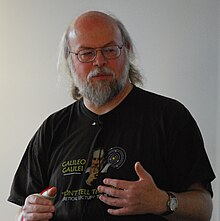
James Gosling
James Gosling, Mike Sheridan, and Patrick Naughton initiated the Java language project in June 1991. Java was originally designed for interactive television, but it was too advanced for the digital cable television industry at the time The language was initially called Oak after an oak tree that stood outside Gosling's office; it went by the name Green later, and was later renamed Java, from Java coffee, said to be consumed in large quantities by the language's creators Gosling aimed to implement a virtual machine and a language that had a familiar C/C++ style of notation
Sun Microsystems released the first public implementation as Java 1.0 in 1995. It promised "Write Once, Run Anywhere" (WORA), providing no-cost run-times on popular platforms. Fairly secure and featuring configurable security, it allowed network- and file-access restrictions. Major web browsers soon incorporated the ability to run Java applets within web pages, and Java quickly became popular. With the advent of Java 2 (released initially as J2SE 1.2 in December 1998 – 1999), new versions had multiple configurations built for different types of platforms. For example, J2EE targeted enterprise applications and the greatly stripped-down version J2ME for mobile applications (Mobile Java). J2SE designated the Standard Edition. In 2006, for marketing purposes, Sun renamed new J2 versions as Java EE, Java ME, and Java SE, respectively.
In 1997, Sun Microsystems approached the ISO/IEC JTC1 standards body and later the Ecma International to formalize Java, but it soon withdrew from the process. Java remains a de facto standard, controlled through the Java Community Process. At one time, Sun made most of its Java implementations available without charge, despite their proprietary software status. Sun generated revenue from Java through the selling of licenses for specialized products such as the Java Enterprise System. Sun distinguishes between its Software Development Kit (SDK) and Runtime Environment (JRE) (a subset of the SDK); the primary distinction involves the JRE's lack of the compiler, utility programs, and header files.
Versions
Main article: Java version history
Major release versions of Java, along with their release dates:- JDK 1.0 (January 21, 1996)
- JDK 1.1 (February 19, 1997)
- J2SE 1.2 (December 8, 1998)
- J2SE 1.3 (May 8, 2000)
- J2SE 1.4 (February 6, 2002)
- J2SE 5.0 (September 30, 2004)
- Java SE 6 (December 11, 2006)
- Java SE 7 (July 28, 2011)
No comments:
Post a Comment